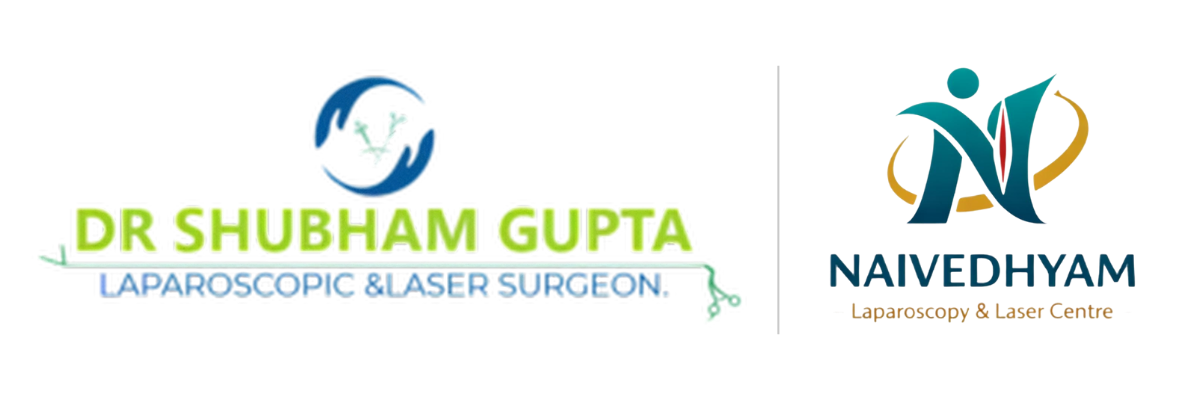Laparoscopic Surgeon in Gwalior
Laparoscopic surgery, often referred to as minimally invasive surgery, has revolutionized the field of surgical medicine by offering patients numerous advantages over traditional open procedures. This technique involves the use of small incisions and specialized instruments, leading to reduced pain, quicker recovery times, and minimal scarring. In Gwalior, one of the leading practitioners of this advanced surgical method is Dr. Shubham Gupta, a highly experienced laparoscopic surgeon dedicated to providing exceptional care to his patients. Meet with Best Laparoscopic Surgeon in Gwalior.

Dr. Shubham Gupta
(Laparoscopic and General Surgeon)
In Gwalior, Dr. Shubham Gupta stands out as a distinguished laparoscopic and laser surgeon with a wealth of experience and a stellar reputation for his advanced surgical expertise. Over the years, Dr. Gupta has successfully performed thousands of procedures, specializing in the treatment of gallbladder stones, inguinal hernias, ventral hernias, hiatus hernias (GERD/reflux disease), piles, fissures, fistulas, intestinal surgeries, and colorectal malignancies.
Dr. Gupta’s impressive academic background includes earning an MBBS degree from Government Medical College, Vellore, where he was awarded a gold medal for his outstanding performance. He further enhanced his surgical skills by completing an M.S. in Surgery at Grant Medical College and JJ Group of Hospitals, Mumbai, followed by a DNB in Surgery. To stay at the forefront of medical advancements, Dr. Gupta has also attained multiple fellowships in laparoscopic techniques, including FMAS, FIAGES, and FUSE (USA).
His expertise spans over 2,500 laparoscopic cholecystectomy (gallbladder surgery) cases, along with advanced laparoscopic procedures involving the stomach, pancreas, biliary system, and colorectal surgeries. He is also proficient in hernia surgeries, utilizing techniques such as open Lichtenstein repair, TEP repair, TAPP repair, eTEP repair, laparoscopic IPOM, laparoscopic IPOM Plus, and laparoscopic fundoplication. Additionally, Dr. Gupta has mastered laser surgery for piles, fissures, and fistulas, offering patients a less invasive treatment option with quicker recovery.
Dr. Gupta is not only known for his technical expertise but also for his compassionate and patient-focused approach. He ensures every patient receives personalized care, addressing their concerns with honesty, kindness, and professionalism. His dedication to delivering top-notch surgical care has earned him the trust and admiration of his patients in Gwalior and beyond.
Laparoscopic Surgery
Laparoscopic surgery is a technique where surgeons perform operations through small incisions, typically ranging from 0.5 to 1.5 centimeters. A laparoscope—a thin tube equipped with a high-resolution camera and light source—is inserted through one of these incisions, allowing the surgeon to view the internal organs on a monitor. Additional small incisions are made to introduce specialized surgical instruments to perform the procedure. This approach contrasts with traditional open surgery, which requires larger incisions to access the surgical site.

Benefits of Laparoscopic Surgery
The adoption of laparoscopic surgery offers several significant benefits:
Reduced Hemorrhaging: Smaller incisions lead to less blood loss during surgery, decreasing the likelihood of needing blood transfusions.
Minimal Scarring: The small size of the incisions results in less noticeable scars, which is particularly beneficial for patients concerned about cosmetic outcomes.
Less Postoperative Pain: Patients often experience less pain following laparoscopic procedures, reducing the need for pain medications.
Shorter Hospital Stay: Many laparoscopic surgeries are performed on an outpatient basis, allowing patients to return home the same day.
Faster Recovery: The minimally invasive nature of the procedure enables patients to resume their daily activities more quickly compared to traditional surgery.
Lower Risk of Infections: Smaller incisions reduce the exposure of internal organs to external contaminants, thereby lowering the risk of postoperative infections.
When Is Laparoscopic Surgery Needed?
Laparoscopic surgery is utilized for both diagnostic and therapeutic purposes across various medical conditions:
Gallbladder Removal (Cholecystectomy): For patients suffering from gallstones or gallbladder inflammation, laparoscopic cholecystectomy is the preferred method due to its minimally invasive nature and quick recovery time.
Hernia Repair: Laparoscopic techniques are commonly used to repair hernias, offering patients less postoperative pain and a faster return to normal activities.
Appendectomy: Removal of the appendix can be efficiently performed laparoscopically, reducing recovery time and postoperative discomfort.
Gynecological Procedures: Conditions such as endometriosis, ovarian cysts, and fibroids are often treated using laparoscopic surgery, which minimizes scarring and preserves reproductive organs.
Diagnostic Purposes: Laparoscopy allows surgeons to examine internal organs to diagnose conditions like chronic pelvic pain, unexplained infertility, or abdominal masses when non-invasive tests are inconclusive.

The Treatment Process
The process of undergoing laparoscopic surgery typically involves several steps:
Preoperative Evaluation: A thorough medical history and physical examination are conducted to assess the patient’s suitability for laparoscopic surgery.
Preparation: Patients may be advised to follow specific dietary restrictions and avoid certain medications before surgery.
Anesthesia: General anesthesia is commonly administered to ensure the patient remains unconscious and pain-free during the procedure.
Surgical Procedure: Small incisions are made, and the laparoscope along with surgical instruments are inserted to perform the necessary operation.
Closure: After completing the surgery, the instruments are removed, and the incisions are closed with sutures or surgical tape.
Recovery: Patients are monitored in a recovery area before being discharged. Postoperative instructions are provided to facilitate healing and minimize complications.
Laparoscopic surgery offers a multitude of benefits, including reduced pain, faster recovery, and minimal scarring, making it a preferred option for many surgical procedures. In Gwalior, Dr. Shubham Gupta exemplifies excellence in this field, providing patients with advanced surgical care that prioritizes their well-being and recovery. His dedication to minimally invasive techniques and patient-centered care has established him as a trusted and respected surgeon in the community.
For individuals seeking expert laparoscopic surgical solutions in Gwalior, Dr. Shubham Gupta’s clinic offers comprehensive services tailored to meet each patient’s unique needs, ensuring optimal health outcomes and a positive surgical experience.
